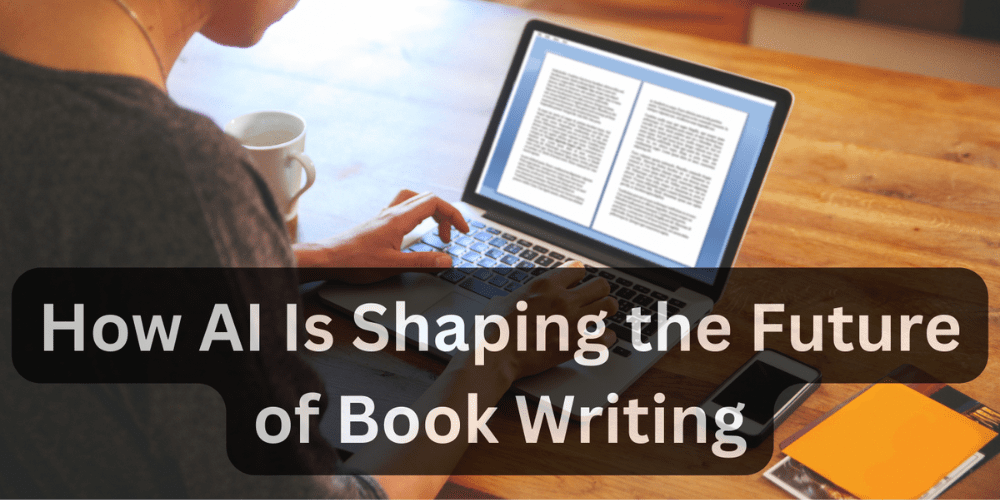Picture this: You’re chilling in your writing nook, the ideas are flowing, and who’s there cheering you on? Your AI buddy! That’s right, we’re not talking about your usual spell check. AI’s stepping up its game, getting all involved in shaping stories, fleshing out characters, and even coming up with plot twists that’ll make your jaw drop.
The book writing scene is getting a major makeover with AI in the mix. This isn’t about machines taking over; it’s about them lending a hand, making the creative process more exciting and, dare we say, a bit easier. We’re diving deep into how AI and human creativity are joining forces to kick the doors wide open to a new era of storytelling.
Ready to see how your next favorite book might be a collaboration between a human and a super-smart algorithm? Let’s get into it.
AI is Becoming an Author’s New Best Friend
First up, let’s talk about how AI is becoming an author’s new best friend. Imagine having a buddy who’s read every book under the sun and can offer advice on everything—from crafting a gripping opening line to developing characters that feel like real people. That’s AI for you. Tools like AI-driven writing assistants are now sophisticated enough to provide suggestions that can enhance a narrative, suggest plot developments, or even come up with dialogue. It’s like having a brainstorming partner who’s available 24/7.
One shining example of this partnership is the emergence of AI book writing software, a revolutionary tool that’s changing the game for authors worldwide. This software not only suggests improvements and generates ideas but also helps in creating complex character arcs and intricate plots, all while maintaining the author’s unique voice.
Unleashing Creativity
Now, you might wonder, “Doesn’t AI cramp the writer’s style?” Quite the opposite! It’s all about unleashing creativity. Writers can use AI to overcome the dreaded writer’s block by generating ideas or scenarios they might not have considered. It’s not about the AI writing the story but about sparking inspiration that leads to new, creative pathways.
Moreover, AI can analyze vast amounts of data to identify trends and themes that resonate with readers, providing authors with valuable insights that can inform their creative decisions. This data-driven approach to creativity can help authors tap into unexplored genres or themes, pushing the boundaries of traditional storytelling.
Personalization With AI
The personalization potential with AI is mind-blowing. Imagine customizing a novel based on the reader’s preferences. Fancy a romance novel with a twist of sci-fi? Or how about a detective story set in your hometown? AI can help tailor stories to individual tastes, making the reading experience incredibly personal and engaging. This level of customization opens up a world of possibilities for interactive and immersive storytelling, where readers can choose the direction of the narrative, leading to multiple endings.
Streamlining the Book Writing Process
Let’s not forget the nitty-gritty of writing. AI can handle the less glamorous aspects, like grammar checks, ensuring consistency in character names and traits, and even fact-checking. This lets authors focus on the creative side of writing, knowing the details are in good hands. Additionally, AI can assist in organizing notes and research, making the writing process more efficient and less overwhelming for authors juggling multiple storylines or characters.
The Future of Book Publishing
AI is also transforming the publishing landscape. Predictive algorithms can analyze reading trends and preferences, helping publishers identify potential bestsellers before they’re even published. Moreover, AI tools can assist in marketing books more effectively by targeting readers who are most likely to enjoy them. These advancements are not only making the publishing process more efficient but also more dynamic, with data-driven strategies ensuring that books find their way to the right audience.
Overcoming Challenges and Ethical Considerations
Of course, it’s not all sunshine and rainbows. The rise of AI in book writing raises questions about originality and copyright. How much of a book written with AI assistance is truly the author’s work? And what about the potential for AI-generated books flooding the market? These are complex issues that the industry is still grappling with. Additionally, there’s the challenge of ensuring that AI tools remain accessible to all authors, not just those with significant resources, to prevent a widening gap in the publishing world.
Wrapping It Up
As we navigate this new era, it’s clear that AI has a lot to offer the world of book writing. From enhancing creativity to streamlining the publishing process, the possibilities are as vast as our imaginations. But as with any partnership, it’s all about finding the right balance. By combining the best of both worlds—human creativity and AI’s capabilities—we’re not just writing books; we’re writing the future.
So, what do you think? Is AI the co-author of the future, or is there a line that should remain uncrossed? The conversation is just beginning, and it’s an exciting time to be a part of the world of books.



































